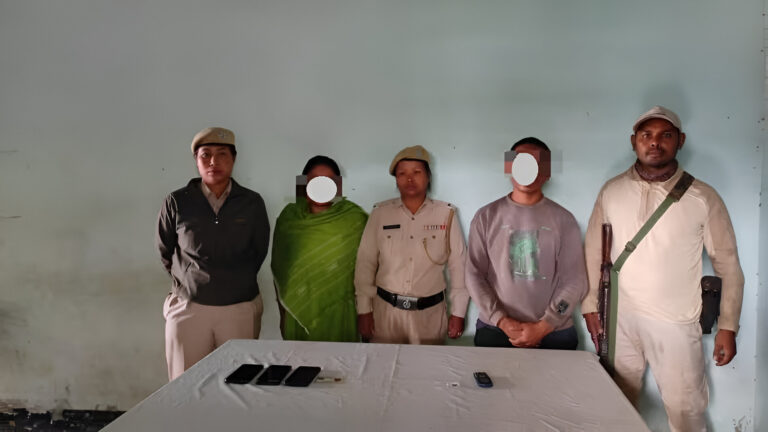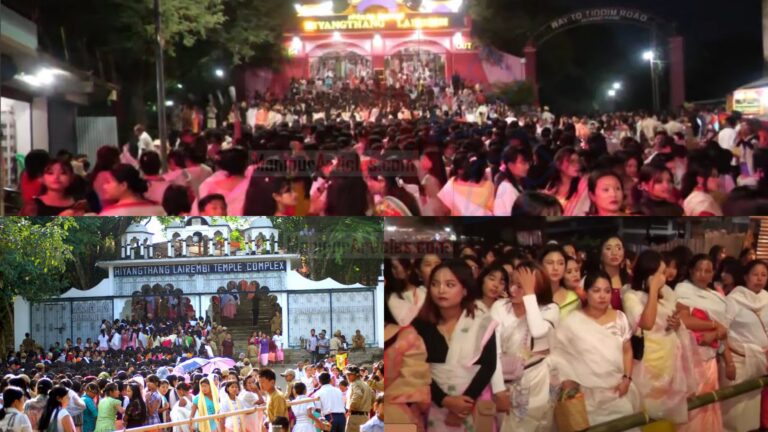BJP Demands Safe Release of Abducted Family Members in Manipur
Summary
The BJP in Manipur is urgently calling for the release of six family members, including women and children, allegedly abducted by militants in Jiribam. The party’s state president, Sharda Devi, condemned the act and appealed for their safe return, emphasizing humanitarian concerns. Civil society groups have also demanded swift government intervention, warning of intensified action if their call is unmet within a week. The incident has raised concerns about the region’s ongoing security challenges and the vulnerability of local communities.
Full Article
The Heartbreaking Incident: Understanding the Context of Abduction in Manipur
Imagine a peaceful home suddenly disrupted by the terror of a family being taken away against their will. This recent abduction in Manipur has shaken not only the family involved but the entire community. Six innocent family members—three women and three young children—were reportedly kidnapped by militants in the Jiribam district, a region already vulnerable to unrest. This incident highlights the ongoing security challenges that locals face and raises important questions about what can be done to prevent such tragedies in the future.
The abduction occurred amid heightened tensions in the state, adding another layer of fear and instability to the lives of residents. BJP Manipur’s state president, Sharda Devi, called the event “unfortunate,” emphasizing the humanitarian aspect of the situation. In her statement, she appealed directly to the captors, urging them to release the family members and allow them to return to safety. The plea for compassion and humanity echoes the sentiments of many locals, who are now looking to authorities for decisive action.
A Community on Edge: Why Manipur is Vulnerable to Such Incidents
The Role of Militants and Unrest
For years, Manipur has been a flashpoint for ethnic tensions and armed insurgencies. Political conflicts and a complex web of ethnic rivalries have led to a volatile environment, with militant groups often taking extreme measures to assert influence or send messages to the government. In this atmosphere, civilians, unfortunately, become the first victims. Families in the affected regions live under constant threat, as abductions and violence are used as leverage in these long-standing conflicts.
The kidnapped family in Jiribam reflects a broader issue of civilian vulnerability. In a conflict where boundaries between militants and non-combatants blur, innocent people often get caught in the crossfire. This abduction is a stark reminder of how insecurity continues to ripple through communities in Manipur, affecting daily life, family stability, and community trust.
The Emotional Toll on Families
Imagine the anguish of loved ones left behind, wondering about the safety of their mothers, sisters, and young children. For the family members who remain, the emotional toll is immense. These incidents leave scars that run deep, affecting mental health and altering lives permanently. Anxiety and grief can become part of everyday existence, and trust within the community often suffers as people grow more suspicious and fearful of strangers.
A child’s innocence, a mother’s care, and a sister’s companionship—these bonds are what define families. The forced separation by abduction is a traumatic experience that changes these relationships forever. The lingering fear of further incidents can even lead to changes in social dynamics, as people start avoiding certain areas, neighbors, or activities to avoid attracting attention from potential threats.
The Role of the Government and Civil Society
BJP’s Call for Action and Humanitarian Appeal
The Manipur BJP, under the leadership of Sharda Devi, has taken a firm stance, labeling this incident as intolerable. By issuing a statement, the party is sending a strong message that the safety of every citizen should be prioritized. They are demanding swift government intervention and urging all law enforcement agencies to focus on locating and rescuing the abducted family.
Sharda Devi’s call emphasizes a humanitarian angle, which resonates with local sentiments. People in the region want reassurance that their government values their lives and well-being above political rivalries. The BJP’s message, therefore, isn’t just about taking a political stance—it’s about demonstrating a commitment to safeguarding human rights and ensuring that no family is left to face such horrors alone.
Civil Society Organizations Stand Together
Civil society groups in Manipur are equally vocal, issuing an ultimatum to the government. They have warned that inaction will have political consequences, signaling their frustration with delayed responses in the past. Civil society is a powerful force in the state, often bridging the gap between the public and the authorities. Their involvement here is a critical push toward accountability, as they represent the collective voice of people demanding justice and security.
In many ways, the response from these organizations is a reflection of grassroots activism. Community leaders, local NGOs, and even religious groups often play an essential role in post-conflict support, helping victims of violence regain a sense of normalcy and providing resources like counseling and legal aid. By raising their voices, these organizations remind the government that their people’s lives are non-negotiable and that every measure must be taken to resolve this crisis.
Security Challenges in Jiribam and Beyond
Why is Manipur Particularly Prone to Such Incidents?
Geopolitically, Manipur’s location makes it particularly vulnerable to cross-border tensions and insurgency. Proximity to international borders has often led to infiltration by militant groups, which then exploit local ethnic divides. Additionally, limited resources, poor infrastructure, and communication gaps in rural areas exacerbate the challenges of maintaining security.
These conditions make it difficult for the government to establish and maintain stable security protocols across the state. Remote areas often lack proper policing, making it easier for militant groups to operate without interference. For residents in these vulnerable zones, life often means adapting to an environment where the government’s reach feels distant and unreliable.
What Needs to Change?
Solving this problem will require a combination of stronger security policies and community-driven initiatives. Enhancing communication networks, deploying special security forces, and setting up early warning systems are some strategies that could help. However, genuine change will also require addressing the underlying issues that fuel unrest. Investment in local infrastructure, access to education, and economic development could all contribute to stabilizing these regions over the long term.
Conclusion: A Plea for Peace in Manipur
The call for the release of the abducted family in Jiribam is more than a response to a single incident—it’s a plea for peace and security for all. This abduction has brought to light the fragility of life in Manipur’s conflict zones, underscoring the need for collective action. The government, political leaders, and civil society must work together to protect innocent lives and create an environment where families can live without the shadow of fear.
There’s an urgency here that cannot be ignored. The people of Manipur deserve a future where their children grow up in safety, their communities thrive, and their families are whole. For this to happen, the commitment to peace and security must go beyond words—it must translate into immediate, compassionate action.
FAQs
- What led to the abduction of the family in Manipur?
- The family was reportedly abducted by militants amidst ongoing regional tensions, but specific motives remain unclear.
- How is the BJP involved in addressing this issue?
- The BJP, particularly Manipur’s state president, has publicly called for the safe release of the family, urging prompt government intervention.
- What role do civil society groups play in such incidents?
- Civil society groups amplify public demand for action, often pushing for accountability and offering support to affected families.
- Are such abductions common in Manipur?
- While not an everyday occurrence, conflicts in Manipur have historically seen occasional abductions and violence due to regional unrest.
- What can be done to prevent such incidents in the future?
- Strengthening security, enhancing communication, and addressing socioeconomic issues can help reduce such incidents over time.




